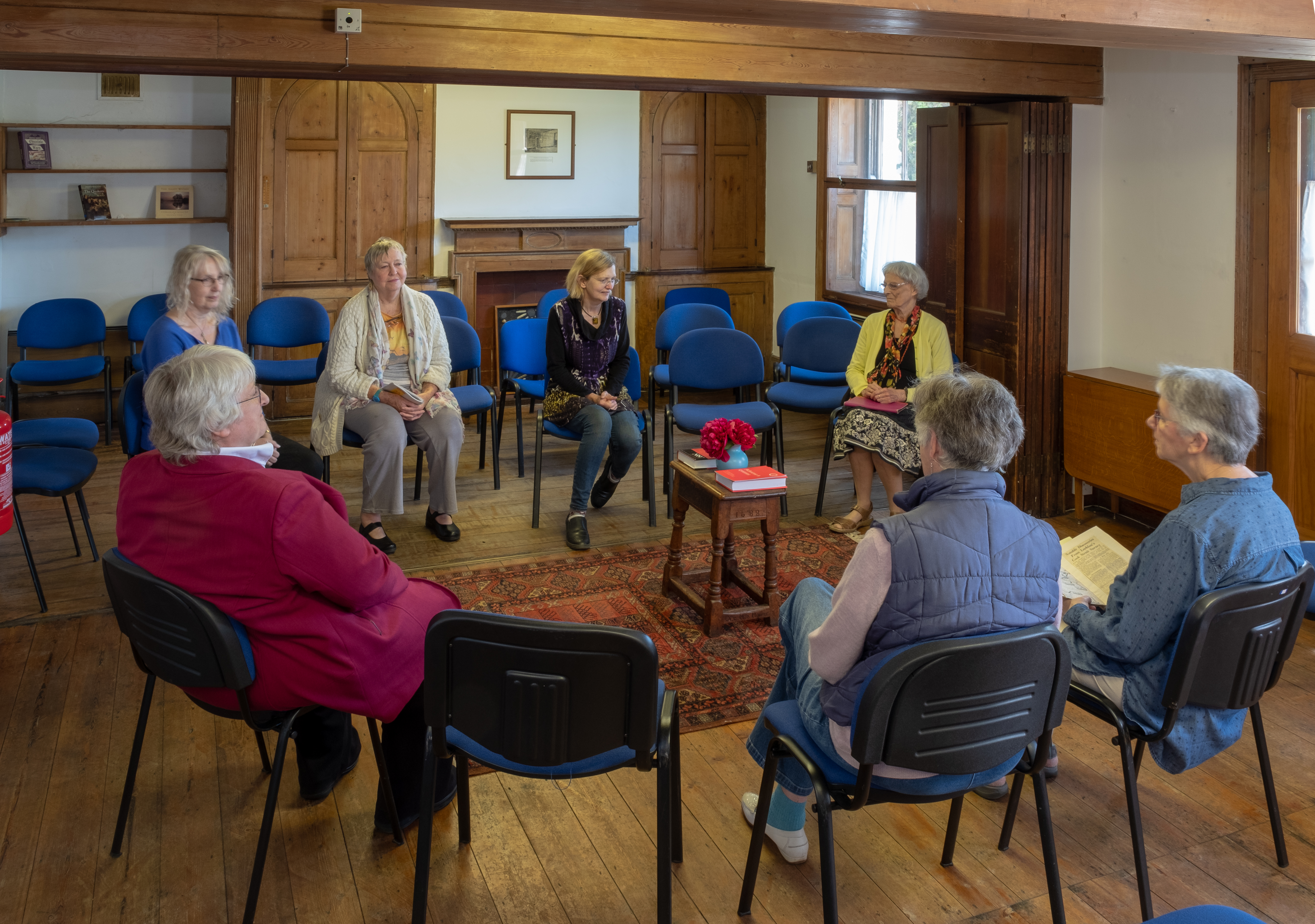Quakers use the term ‘Meeting’ in many different ways – from the way we conduct our business to the way we conduct our worship. We also use it to use it to describe a group of Friends from a particular location (e.g. Aylesbury Local Meeting, Chilterns Area Meeting, Britain Yearly Meeting…) This can all be quite confusing for those new to Quakerism.
Aylesbury Meeting recently held a ‘Sharing and Learning’ Meeting (another type yet again!) to explore and explain the different types you might encounter at Aylesbury. This is the outcome of that discussion.
Some of these you will find at your Quaker Meeting House, others not. Perhaps you have also come across others at your Meeting. If so, please do tell us about them.
Meeting for Worship
This was not on the agenda for this particular discussion, but we emphasised that it was the most important meeting for Quakers. In our meeting for worship earlier that day, Quaker Faith and Practice 2.35 and 2.36 were read out: ‘know one another in that which is eternal’ … ‘in the depth of common worship it is as if we found our separate lives were all one life’.
Meeting Matters (MM)
(See Quaker Faith and Practice [QFP] 2.85-2.92)
Also called:
- Meeting for Worship for Business
- Meeting for Church Affairs
MM has a Clerk, and should be well prepared with an agenda, relevant papers and reports from groups (e.g. outreach activities, premises committee) which are read in advance by those attending. Nevertheless, the emphasis is on coming to the meeting with an open mind as far as possible, not made up in advance. MM has an administrative function, has minutes and has statements of record.
Quakers have long-established ways of approaching Meeting Matters (or Meetings for Worship for Business), many of which are felt to be valuable, serving to uphold particular ways of conducting affairs. These established ways are sometimes referred to as ‘right ordering’, but we also seek to be flexible and wary of being restricted by rules, seeking rather to find what works best for our particular Meeting. Such approaches have thus sometimes included suggestions of: standing up to speak; only speaking when the Clerk indicates; not needlessly repeating a point; speaking only once on a topic; and keeping the silence.
MM is usually the only meeting in which the decisions for the local Quaker meeting are taken. Decisions are taken through dialogue and discussion, followed by discernment.
It is useful to look at the meanings of these words. Dialogue is a conversation between two or more people; discussion is a conversation which examines different ideas and issues. But discernment is recognizing or finding out something, which is not obviously apparent (e.g. I discerned a slight noise in the background). The Latin root for discern is to ‘separate apart’.
In the words of Joycelin Dawes (‘Discernment and Inner Knowing’) ‘discernment is living in accordance with our inner knowing, a stream of wisdom and will-to-good that arises as we are in touch with our deepest inner place or source.’ Dawes uses the Theory U model of discernment where we journey down one side of the U to God or Spirit or our inner source, then up the other side to the decision. In Meeting Matters this is a corporate process: we reach the ‘feeling of the meeting’. Discernment is finding out the will of God, Spirit or a deeper wisdom: it is not just coming to an agreement which we might call reaching a consensus.
Various qualities are needed by those participating: listening with love, patience and openness to other people and their ideas, based on equality between participants. The last-mentioned is expressed in the phrase (from QFP 3.05) ‘to everyone is given a measure of the light’. Approaches which are not generally felt to be helpful for Meeting Matters include lobbying, rhetoric and clever argument.
Other meetings
Sharing and Learning meetings
These are our gatherings for sharing our ideas, thoughts and emotions together and learning from each other. Some of the approaches below are likely to be used. Sometimes there is a written record, sometimes not. Each meeting usually has a facilitator.
Worship Sharing and Creative Listening
These are somewhere between meeting for worship and a study/discussion group, with worship sharing nearer to a meeting for worship and creative listening nearer to a study/discussion group. ‘Creative listening’ means going beyond the words.
Confidentiality is key (as it is with all of these groups). There should be pauses for reflection between contributions and sometimes a token is used to facilitate this.
Examples are some sharing and learning meetings, and the spiritual companions group.
Informal Social Gatherings
These include tea/coffee after meetings for worship, and the summer and Christmas shared meals. These are an important part of the life of the Meeting.
Study and Discussion Groups
These will be on specific topics and many sharing and learning meetings are of this type. Another example is the book club.
Meeting for Clearness
A meeting for clearness can be set up to help an individual or couple to make a decision, e.g. to get married, to go abroad, or to carry out some Quaker service. The individual is supported in making up his or her own mind by a small group of experienced Friends.
Threshing Meetings
A threshing meeting is an opportunity to express different opinions on a specific task or issue. These opinions may be strongly felt and be controversial, and may be at odds with each other. It is an opportunity to ‘thresh’ or thrash out a difficult issue. Usually there is no concluding minute.
A threshing meeting can be a useful preparation for a later MM on a difficult issue. Some sharing and learning meetings are threshing meetings.
Support Group
This is a small group of supportive Friends who may help someone who is facing difficulties in life.




Leave a Reply
You must be logged in to post a comment.